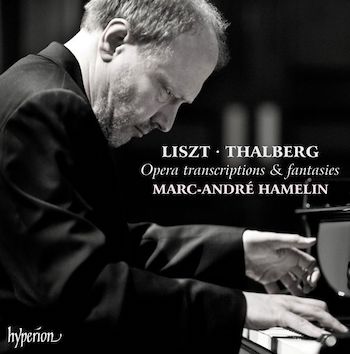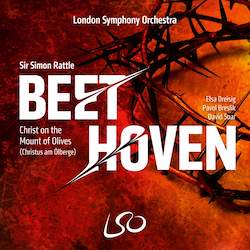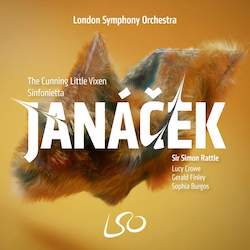Classical CD Reviews: Listening During COVID — Beethoven’s Jesus, Liszt’s Variations on “Norma,” and Janáček’s Animal Opera
By Ralph P. Locke
Concert halls and opera houses remain closed — but unusual musical experiences await in this era of social isolation.

I’m surely not the only music lover who has been in a state of semi-mourning for nearly eight months now. We are deprived of the vivifying experience of hearing great classical music in superb performances while sitting in a hall whose acoustics are that special blend of resonant and pinpoint-precise. We miss the camaraderie and mutual encouragement of listening along with hundreds of others who have set time aside to receive and ponder these specially prepared and curated, marvelous sounds.
Is there some way to recapture the thrill of live performance during this era of social isolation?
Well, one solution is surely to watch video-streamed concerts and opera performances, such as those of the Philadelphia Orchestra and the Metropolitan Opera. I’ve done that at times and found it heartening.
But another way is to invite first-rate performers into your home on CD or through streamed audio, and to have them play and sing (preferably through a good amplifier and loudspeakers or earphones—or in that earphones-on-wheels called an automobile) some music that is less familiar to you but that they carry off with enormous flair and artistry.
That’s the experience I had recently with three new record releases: opera fantasies by Liszt, Beethoven’s oratorio about Jesus’s last night, and Janáček’s opera about the animals of the forest.
The Liszt disc is played by one of the renowned super-virtuosos of our day: Marc-André Hamelin. Now based in Boston, Hamelin has made over 60 CDs of many of the most demanding works in the repertory, including some that are rarely performed. Here he brings us what may be the very best of Liszt’s many operatic fantasies: Réminiscences de “Norma.” Bellini’s limpid, gently florid melodies have enchanted listeners for close to two centuries and inspired fellow composers (such as Chopin). Here Liszt captures with remarkable power, on a single instrument, the eloquence of a singer and the colors of an orchestra, and also sketches the special solemn and ecstatic moods that are unique to this still-cherished opera. Hamelin’s performance itself conveys a sovereign majesty while also sounding spontaneously human. I felt privileged to have him play for me alone some of the greatest tunes ever written. The disc also contains other opera fantasies by Liszt, his rival Sigismond Thalberg, and a collectively written Hexaméron, with one variation each by six composers (including Liszt and Chopin) on a rousing march tune from Bellini’s I Puritani.
 Lovers of choral music know Beethoven’s Ninth and perhaps the Choral Fantasy (a most peculiar work that is partly a piano concerto). But fewer tend to know Christ on the Mount of Olives, a 45-minute-long oratorio that Beethoven composed in 1803 for performance on a concert that also included the premieres of his Symphony No. 2 and Piano Concerto No. 3. Two years before his opera Fidelio (1805; revised 1814), it already shows keen insight into how music, combined with a richly inspiring story, can reflect the moods of various charcters and intensify the events of a drama. The characters are Jesus (tenor), a Seraph (soprano), and the disciple Peter (bass). The chorus plays three different roles. The recorded performance, from two concerts by the London Symphony Orchestra this past January and February, is led by the orchestra’s esteemed music director Simon Rattle. The astoundingly full and precise London Symphony Chorus was prepared by the equally renowned Simon Halsey. The three soloists are, well, heavenly: clear and firm, yet responding with apt variety to the changing emotions of the text. Particularly notable are Christ’s soul-wracked prayer to God to “take from me this chalice of suffering,” the Seraph’s stentorian declaration of God’s message (complete with solemn trombones), and the sharply contrasting reactions of the Chorus of Soldiers, of Peter and the other Disciples, and of the Chorus of Angels at the moment of Jesus’s arrest. In Beethoven’s setting, the messages “Forgive your enemies” and “Love your neighbor” come through resonant and strong.
Lovers of choral music know Beethoven’s Ninth and perhaps the Choral Fantasy (a most peculiar work that is partly a piano concerto). But fewer tend to know Christ on the Mount of Olives, a 45-minute-long oratorio that Beethoven composed in 1803 for performance on a concert that also included the premieres of his Symphony No. 2 and Piano Concerto No. 3. Two years before his opera Fidelio (1805; revised 1814), it already shows keen insight into how music, combined with a richly inspiring story, can reflect the moods of various charcters and intensify the events of a drama. The characters are Jesus (tenor), a Seraph (soprano), and the disciple Peter (bass). The chorus plays three different roles. The recorded performance, from two concerts by the London Symphony Orchestra this past January and February, is led by the orchestra’s esteemed music director Simon Rattle. The astoundingly full and precise London Symphony Chorus was prepared by the equally renowned Simon Halsey. The three soloists are, well, heavenly: clear and firm, yet responding with apt variety to the changing emotions of the text. Particularly notable are Christ’s soul-wracked prayer to God to “take from me this chalice of suffering,” the Seraph’s stentorian declaration of God’s message (complete with solemn trombones), and the sharply contrasting reactions of the Chorus of Soldiers, of Peter and the other Disciples, and of the Chorus of Angels at the moment of Jesus’s arrest. In Beethoven’s setting, the messages “Forgive your enemies” and “Love your neighbor” come through resonant and strong.
Likewise from the LSO Live label comes Janáček’s 1923 opera The Cunning Little Vixen. The noun here refers to a very determined female fox, not a wily woman. Indeed, most of the main characters here are forest animals, though there are a few humans as well, notable a Forester, who sets out to trap and kill the vixen but chooses to bring her home as a pet, setting off a series of episodic adventures.
The orchestra, chorus, and conductor are the same as in the Beethoven, and the performances blended here were from 2019, stage-directed by Peter Sellars. I was mighty curious to know what Sellars, an imaginative if sometimes willful theater artist, brought to this deeply humane fable. The few photos in the booklet show no costumes or sets but much acting and near-dancing, and much moving around.
 Nonetheless, hearing the work performed so astutely presented a rich experience in itself. I focused on the details in the libretto (well translated in the booklet) and particularly enjoyed the singing of Lucy Crowe (Vixen), Sophia Burgos (Male Fox, also the Hen Chocholka), and the great baritone and Lieder singer Gerard Finley (as the Forester). The roles are performed relatively “straight.” (Some recordings made in the Czech lands over the years use funny voices to help us differentiate the various animals.) The results emphasize the work’s purely musical values, which are truly remarkable.
Nonetheless, hearing the work performed so astutely presented a rich experience in itself. I focused on the details in the libretto (well translated in the booklet) and particularly enjoyed the singing of Lucy Crowe (Vixen), Sophia Burgos (Male Fox, also the Hen Chocholka), and the great baritone and Lieder singer Gerard Finley (as the Forester). The roles are performed relatively “straight.” (Some recordings made in the Czech lands over the years use funny voices to help us differentiate the various animals.) The results emphasize the work’s purely musical values, which are truly remarkable.
The two-disc set concludes with a brilliant performance of Janáček’s tightly constructed Sinfonietta, one of his most endearing pieces.
All three releases brought color, air, space, joy, and moments of quiet contemplation to my life of obedient isolation. They also helped me remember how rich and varied the treasure-house of classical music is when one looks beyond the warhorse repertory of Appassionatas, Elijahs, and Toscas.
Though, now that I think of it, I haven’t listened to the “Moonlight” Sonata in a long time. This could be a good moment…
(All three recordings are available as physical CDs, as downloads, or through subscription streaming services such as Apple Music, Spotify, YouTube, and Naxos Music Library. Naxos also provides full downloadable booklets for most recordings that it streams, even ones on other labels than Naxos. One can sample the beginning of each track of the above recordings at such sites as PrestoClassical, HBDirect, ArkivMusic, and, again, Naxos Music Library.)
Ralph P. Locke is emeritus professor of musicology at the University of Rochester’s Eastman School of Music. Six of his articles have won the ASCAP-Deems Taylor Award for excellence in writing about music. His most recent two books are Musical Exoticism: Images and Reflections and Music and the Exotic from the Renaissance to Mozart (both Cambridge University Press). Both are now available in paperback; the second, also as an e-book. Ralph Locke also contributes to American Record Guide and to the online arts-magazines New York Arts, Opera Today, and The Boston Musical Intelligencer. His articles have appeared in major scholarly journals, in Oxford Music Online (Grove Dictionary), and in the program books of major opera houses, e.g., Santa Fe (New Mexico), Wexford (Ireland), Glyndebourne, Covent Garden, and the Bavarian State Opera (Munich).
Tagged: Hyperion, LSO Live, Marc-Andre Hamelin, Ralph P. Locke, Simon Rattle’
